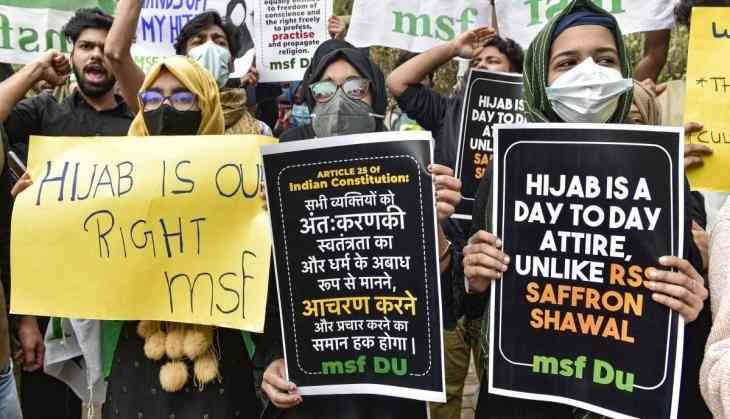
The Karnataka High Court ruled that the donning of the hijab is not an essential religious practice in Islam. "We are of the considered opinion (that) wearing of hijab by Muslim women does not form a part of essential religious practice in Islamic faith," the bench headed by Chief Justice Ritu Raj Awasthi said.
The court, which has over the past couple of weeks been listening to a collection of pleas challenging the hijab ban, said it had asked itself three questions.
Here are three questions:
1. Whether the wearing of the hijab is essential religious practice under Islam,
2. Whether the prescription of school uniform is violative of rights, and
3. Whether the Karnataka government order of February 5 (which barred students from wearing clothing that could 'disturb peace, harmony, and law and order), apart from being incompetent and manifestly arbitrary, violates Articles 14 and 15.
The high court's answer were as follows:
1. Wearing of hijab my Muslim women not part of essential religious practice under Islam.
2. Prescription of school uniform is a reasonable restriction that students can't object.
3. The government has the power to issue an order.
During this hearing, the students argued wearing the hijab is an essential religious practice under Islam and its ban, even for a few hours, breaches fundamental rights under Articles 19 and 25 of the Constitution.
The state held the petitioners were seeking to declare the hijab as an 'essential religious practice', which, if welcomed, would secure every Muslim woman to follow a specific dress code.
The contention over the hijabs began in January after two government colleges in the districts of Udupi and Mangaluru banned girls from entering the classroom while sporting the hijab.
This prompted a massive protests and, in some cases, violent stand-offs between those supporting the right to wear the hijab and those not in favour of it.
Protests erupted after fringe groups mobilised men wearing saffron scarves to stop women in hijabs from going to schools and colleges. Clashes blew up in Shivamogga district and others, leading to the Karnataka government to issue a order on February 5 that said students would not be allowed to attend classes if they insisted on wearing a hijab.
Also Read: Human-induced climate change can cause dangerous disruption in nature: Scientists


